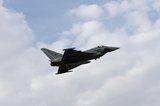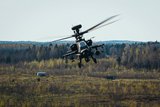QinetiQ signs UK aircrew research contract
QinetiQ has signed a £5 million contract with the Defence Science and Technology Laboratory (Dstl) that will see it conduct research to improve military aircrew performance, it announced on 21 May.
QinetiQ will work with small and medium enterprises (SMEs) on the four-year contract, undertaking ten research projects that enable the Ministry of Defence (MOD) to make better decisions on training, future technology and equipment procurement.
The ten projects will include work to understand the risks of inhaling high concentrations of oxygen in the high-G environment of modern jets; how to optimise the balance between hearing protection and being aware of important audible cues; and the test and evaluation of current and future aircraft and helicopter seat technology for suitable protection.
QinetiQ will also work on projects to understand the long-term risks of high-altitude flying, to assess materials for protecting aircrew against lasers, to understand the cause and effects of fatigue on aircrew, and developing tailored solutions to reduce the risk of and to mitigate spatial disorientation risk while flying.
In addition, the company will conduct evaluation and computer modelling on the role of helmets and helmet-mounted equipment in muscle injury and fatigue, test and evaluate operational clothing that balances comfort and weather protection, and develop ejection injury criterion for improving ejection safety.
Gaz Borland, managing director for the air business, QinetiQ, said: 'This contract builds on our established reputation of being experts in human performance, especially in the air world. Working with academia and SMEs we will be able to help the MOD on the best ways to protect and improve the working environment of aircrew, whether this be through technology or medical research. We will be able to maintain the UK’s capability in aerospace medicine whether in military or civil industry.'
More from Defence Notes
-
![Why small guns have been critical to layered CUAS architectures]()
Why small guns have been critical to layered CUAS architectures
Multiple countries have been deploying small arms as the last line of drone defence due to their multiple operational and tactical advantages.
-
![Singapore Airshow 2026: ST Engineering hints at export success for AME assault rifle family]()
Singapore Airshow 2026: ST Engineering hints at export success for AME assault rifle family
The Singapore-based technology company unveiled its new rifle family at this week’s airshow. Chen Chuanren spoke with the ST Engineering’s head of small arms to find out more about how the weapons have been refined.
-
![High tension in the High North – a wake-up call for NATO’s future Arctic defence efforts?]()
High tension in the High North – a wake-up call for NATO’s future Arctic defence efforts?
Any potential ‘Arctic Sentry’ mission would be months in the planning, but with tensions high in the region given the US’s push for Greenland, NATO countries will need to continue to emphasise their commitment to the region, analysts have said.
-
![Venezuela prepares personnel and equipment for a potential second US attack]()
Venezuela prepares personnel and equipment for a potential second US attack
Defence Minister Gen Vladimir Padrino López has declared that the Venezuelan armed forces “will continue to employ all its available capabilities for military defence”.
-
![As the new year starts, the UK defence spending delay continues]()
As the new year starts, the UK defence spending delay continues
The UK’s defence spending commitments remain uncertain as the government’s Defence Investment Plan, which had been due by the end of 2025, is yet to be published.
-
![How might European countries look to tackle drone incursions?]()
How might European countries look to tackle drone incursions?
Disruption of infrastructure in Europe, whether by cyberattack, physical damage to pipelines or uncrewed aerial vehicles flying over major airports, as has happened more recently, is on the rise. What is the most effective way of countering the aerial aspect of this not-so-open warfare?

























